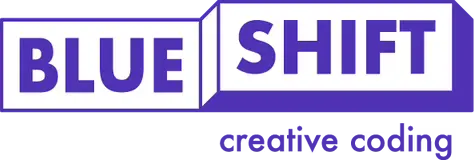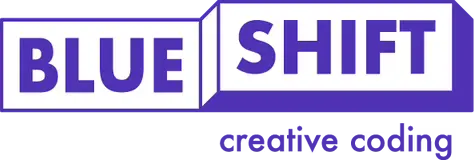Meet Harvey - blue{shift}'s Head of Education
In this short Q&A, we sat down with Harvey Jones—blue{shift}’s Head of Education—to discuss his background and experiences.
Before being a part of the blue{shift} team Harvey graduated from Oxford University, going on to complete a joint MSc at the Royal College of Art & Imperial College London. Following this, Harvey worked within the EdTech sector and has an impressive teaching background having tutored computing students for over 4 years.
Now, as Head of Education, Harvey is responsible for a whole range of things - from creating the blue{shift} syllabus to being our online hackathon instructor. Recently we had a chance to sit down with him and ask him some questions about his experiences with coding and learning!
When did you first start coding?
I first started when I was in Year 12. I had always been interested in creating and I wanted to learn how to code so I began teaching myself Python and did this as part of an Extended Project Qualification (EPQ) alongside my A-Levels. Back then I was programming simple games—Flappy Bird was my first—as well as programmes to support some of the content in my Maths and Physics A-Levels. I'm pleased to say that I haven't really stopped coding since!
As a kid, I always watched Art Attack and Smart, and absolutely loved LEGO and Kinex. I guess programming was another way to create and express my ideas. I think it's easy to view programming as being about creating something digitally instead of physically. But I have to say - I also love physical computing! Whether it’s LEGO Mindstorm, Arduino, or Raspberry Pi, it's great fun making robots and other gadgets that have a physical computing or hardware element. I don't mind admitting that this side of tech does get the inner kid within me so excited.
What is it about tech that you like the most?
I think technology can be really empowering! If you have an idea for something, whether that's a game, an app, or something else, you can just make it. This is even easier nowadays as well, as thanks to the internet if you don’t have the skills it only takes a few clicks to find an expert who's willing to teach you. This is a big reason why I am thrilled to have joined the blue{shift} team - our organisation brings together wonderful teachers who can guide, inspire, and empower young inventors, something that I wish had been available for me when I was younger.
When you get frustrated with coding, what do you say to yourself?
In all honesty, I tend not to get too frustrated while programming any more. I’ve learnt over the years that making mistakes is a huge part of the process and you have to be comfortable with that fact. Even if you end up repeating the same debugging steps, each time you learn something new in the process. I guess you could say patience is another key skill computing has taught me. This is something we always try and convey during our lessons too - it’s OK to mess up.
How have your technological skills helped you in other areas of your life?
Before answering that question, I think there is an interesting distinction to be made between computational thinking and coding. Coding is the specific solution and execution of a problem, whereas algorithms, design, planning, and logical reasoning all make up computational thinking. Whilst programming has enabled me to create awesome projects, the computational thinking skills are really the things that are vital to many parts of my life. You know, in this way computational thinking and the skills associated with it are totally transferable. Without these skills I think I would have a very different approach to the world - they truly are influential to literally any project I am involved with, not just coding.
If you could give one tip to a new coder, what do you think you would say?
You’re going to make mistakes - be comfortable with it and persevere!
For lots of our older students, important life decisions like GCSE’s and A-Levels are on the horizon - what would you say to someone who’s unsure whether they should pursue a computer science route?
My best piece of advice is really simple: just give it a go. Computing has the potential to be whatever you want it to be, whether that is gaming, apps, machine learning, augmented reality, inventing gadgets, special effects, or anything else you can think of. It's so vast that there will be something out there that resonates with you. And the best way to find that? Just start coding and you'll find your passion.
Plus, as I said earlier, computing isn’t just coding - it’s a way of thinking and a set of skills that are transferable to any pathway in life. Once you've got the hang of computing it is way easier to persevere and succeed at something you love, and you can apply it to a huge range of aspects in your life, including other academic subjects. Coding is the simplest way to access computing and it is something that's really easy to try out before you commit to it academically, but there are different routes for everyone. Whatever you decide to focus on just give it a shot - the digital world is your oyster.







